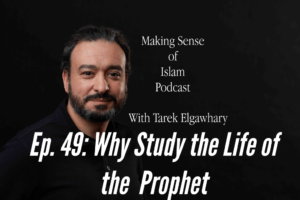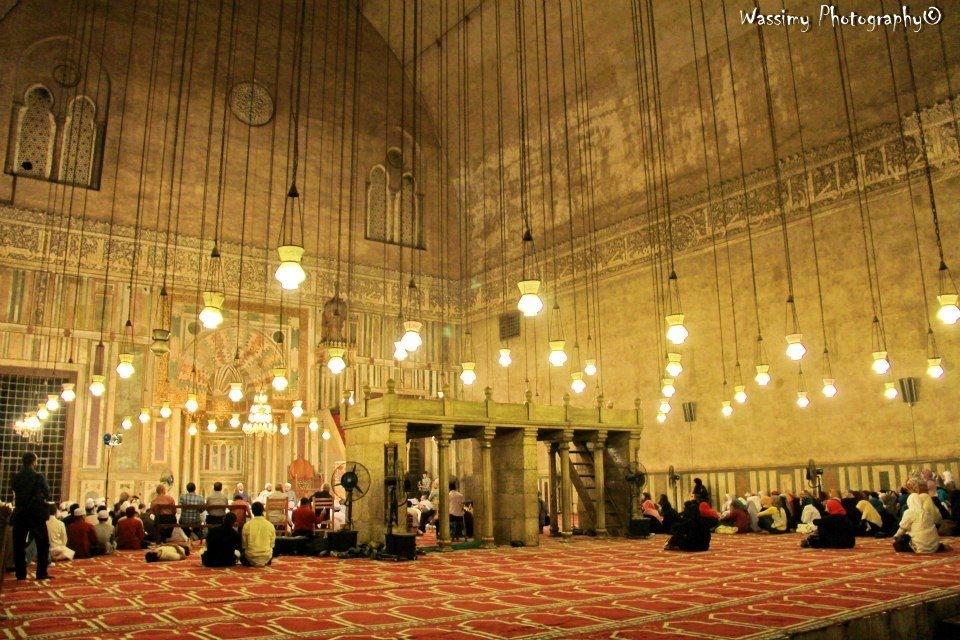Episode 49: Why Study the Life of the Prophet
The life of the Prophet (Sīra) is one of the most important aspects of the entire Islamic religion. In this episode I lay out some broad arguments of why it is fundamental for us to learn and study his life story. I also provide some thoughts on how we should think of this subject before we approach it.

Episode Notes
Why Study the Sīra?
(1) This is not simply a historical retelling of events, but understanding how the meanings of Islam manifest in reality. – The Prophet ﷺ was/is the perfection manifestation of Islam. -The hadith of ‘Aisha: كان خلقه القرآن
(2) We want to know the personality of the Prophet ﷺ, not just historical events. But personal details and preferences.
(3) To see the “perfect example” أسوة حسنة as the verse indicates. To see the Prophet ﷺ in all aspects of life so as to serve as our personal guideline.
(4) To help us understand the Quran.
(5) To generate the most authentic understanding of the Islam….i.e. its sources. -for example extremists ironically do not follow the sunna, but rather follow personalities they have taken to embody the sunna. Whereas we actually follow the sunna. Our intellectual history simple gives us precedent and principles through which to follow it.
(6) An example for an active/productive member of society regardless of position/age/gender, etc.
(7) The most important is to help us love and and follow him.
تَعصي الإِلَهَ وَأَنتَ تُظهِرُ حُبَّهُ * هَذا مَحالٌ في القِياسِ بَديعُ
لَو كانَ حُبُّكَ صادِقاً لَأَطَعتَهُ * إِنَّ المُحِبَّ لِمَن يُحِبُّ مُطيعُ
A Word on Sources
- people could read and write at the time of the Prophet ﷺ
- Some of the Companions wrote down the hadith during the time of the Prophet ﷺ: – ‘Abd Allah Bin ‘Amr الصحيفة الصادقة – ‘Ali Bin Abi Ṭālib – Abu Hurayra -Zayd Bin Thābit صحيح البخاري كتاب العلم عن أبي هريرة يقول ما من أصحاب النبي صلى الله عليه وسلم أحد أكثر حديثا عنه مني إلا ما كان من عبد الله بن عمرو فإنه كان يكتب ولا أكتب حديث أبي داود عبد الله بن عمرو قال كنت أكتب كل شيء أسمعه من رسول الله صلى الله عليه وسلم أريد حفظه فنهتني قريش وقالوا أتكتب كل شيء تسمعه ورسول الله صلى الله عليه وسلم بشر يتكلم في الغضب والرضا فأمسكت عن الكتاب فذكرت ذلك لرسول الله صلى الله عليه وسلم فأومأ بأصبعه إلى فيه فقال اكتب فوالذي نفسي بيده ما يخرج منه إلا حق
- Prophet ﷺ ordered written documents, treatise, and letters. Some of the Companions were his scribes.
- Grading of hadith: *harsh with aḥkām * loose with stories and morals • Islam is concerned with the moral character of the narrator, first and foremost.
Types of Works Related to the Prophet
ﷺ 1. Sīra: Raḥīq al-Makhtūm, Sīra of Shibli Nomani, Martin Lings, Revelation: The Story of Muhammad by Meeraj Mohiuddin
2. Shamā’il: A Portrait of the Prophet by Imam Tirmidhi Fons Vitae
3. Khaṣā’s: The works of Imam al-Suyuti, the lesser Khasis is translated
4. Dalā’il al-Nubuwwa: al-Asfahani, etc. [One is translated]
5. Books about the prayers on the Prophet ﷺ, e.g. Dalail al-Khayrat, Bashā’ir al-Khayrāt, Kunūz al-Aṣrār, etc.
6. Aspects of his life: wives, family, tools, government, names
keep learning
Understanding the Muslim Mind
If we could take all of Islamic intellectual history, what sort of patterns and principles could we deduce? More importantly, if we found someone who actually knew all this information, what would they look like, think like, talk like, etc.?
What is Usuli Islam?
In The Clock of the Long Now, Stewart Brand argues that religion is one of the most durable institutions of civilization that helps ground us all in timeless values. In his concept of the forces of innovation (rapidly changing) and durability (slow changing) of civilization, religion would definitely be amongst the more slow adapting forces.
MORE




